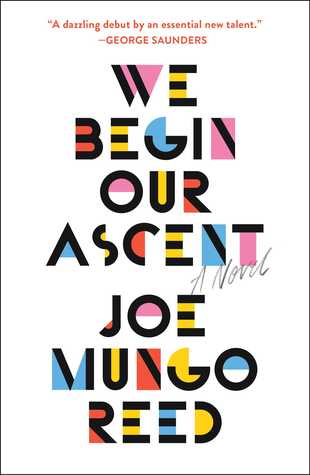In these internet times, blurbs are often the entry point for book reading, and that is true in the case of We Begin Our Ascent, a debut fiction novel from Joe Mungo Reed. The description proffered a look into the life of professional cyclist, Sol and his research biologist wife, Liz as they navigate various moral choices. There’s nothing wrong with that description, however, I’ll add for potential readers that the novel follows Sol during the Tour de France, so scenes of Sol and Liz’s married life are mostly seen through memories.

If I’d known that the book described Sol’s grueling, punishing days spent on the Tour de France, I might have passed over the novel, and that would have been my loss. The book could be categorized as a sport novel, but that categorization is limiting. Essentially this is a novel about how far we are prepared to go to achieve our goals, and just how much we are willing to sacrifice.
We join Sol on day 12 of the Tour de France. Sol is a “domestique,” It’s his job to support team leader, Fabrice:
We are competing only to get our team leader, Fabrice, across the twenty-one stages of this tour in as little time as possible. This cumulative time, the criteria on which the winner of the tour is judged, is all that matters to us. Our own results are not important. We shade him from the wind, pace him, will give him our own bike if he punctures. These measures have just small effects upon his time, yet this is a sport of fine margins–decided by difference of seconds after days and days of riding–and so small advantages, wrung from our fanatical assistance of our strongest rider, offer our team the best chance of victory. We only think of the ever-rising time it takes Fabrice to make his way through this race, how that time compares to his rivals’, how we may act to lessen it.
Some days the route is mountainous, and other days the land is flat. Before and after each day’s race, as Sol makes his preparations, he thinks of Liz, a specialist in Zebra fish, and how they met. So we see two people with extremely different career goals pursue an elusive end-point. While Liz’s colleagues “marveled at her fluency” in her specialist field, “in her actual accomplishment of the position she had built so long toward, she was truly faced for the first time with the scant effect of the work she had chosen, the world’s apparent indifference to all her expertise.” In contrast to Liz, to those outside of the cycling world, Sol appears to have some sort of stardom, but Sol realises, like most athletes, that he has a short shelf life, and he will never be a household name.
“It must be nice to be able to succeed to clearly,” she said. “To have such definite parameters. Clear successes. No one is cheering me in my lab.”
I knew next to nothing about the Tour de France before reading this book, and since I’m not that interested in sport, it’s to the author’s credit that I enjoyed this novel. But then again, the plot rises above sport, racing, training and instead hits obsession and moral dilemmas when Sol reveals various strategies involving drugs. We spend days with Sol as part of the peloton, his grueling routine, his life of preparation, deprivation and superstition:
I had assumed, when I became a professional, that things would be more intense, somehow, more vivid, and real. The reality, though was that my life had become smaller. I prohibited myself from many things, set myself a limited pattern of thinking. It is perhaps obvious in hindsight, but obsession does not give you more, but less.
I loved the vivid scenes when Sol recalls how he tried to explain his career to skeptical his in-laws who don’t get that the Tour de France isn’t about Sol winning, and Sol’s dialogues with former cycling champion, now coach Rafael were simply brilliant. One night, Sol is called to a meeting with his coach in the hotel basement:
“What do women like about men?” he said. “What does your wife like about you?”
“Conversation?” I said.
He shook his head.
“Commitment? Empathy?” He kept shaking.”Jokes? Cooking?”
“Okay, okay, okay,” he said. “Perhaps all of those things a little bit, but what they like a lot is height. Of all the James Bonds only Daniel Craig has been under six foot. And what is Daniel Craig?”
He mimed flicking something off the table. “A little goblin.”
“I like Casino Royale,” I said.
“Of all the Bonds, only Roger Moore has the true British style.” Rafael wrinkled his nose. There was rattling from the laundry chute and a ball of towels shot out. “Women like height. So in the chase for this, how you say, ‘hypothetical girl in our village,’ height is important.”
“Okay,” I said, “I can see that.”
“And it is man’s nature to maximize every advantage.”
The novel’s conclusion seems a little moralistic, and prior to that, the plot was much more sophisticated and deserved, IMO, a slightly different ending. Still, in spite of that, I was glued to every entertaining, thoughtful page.
review copy

You must be logged in to post a comment.